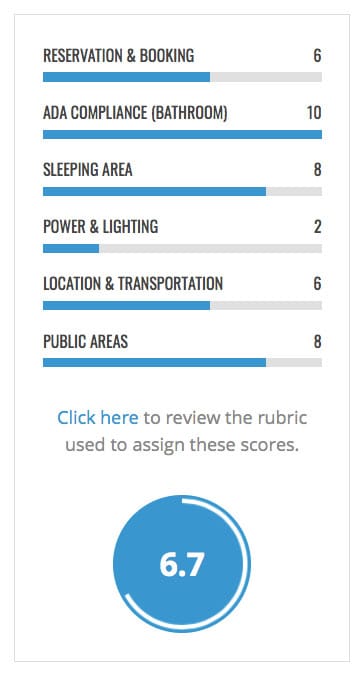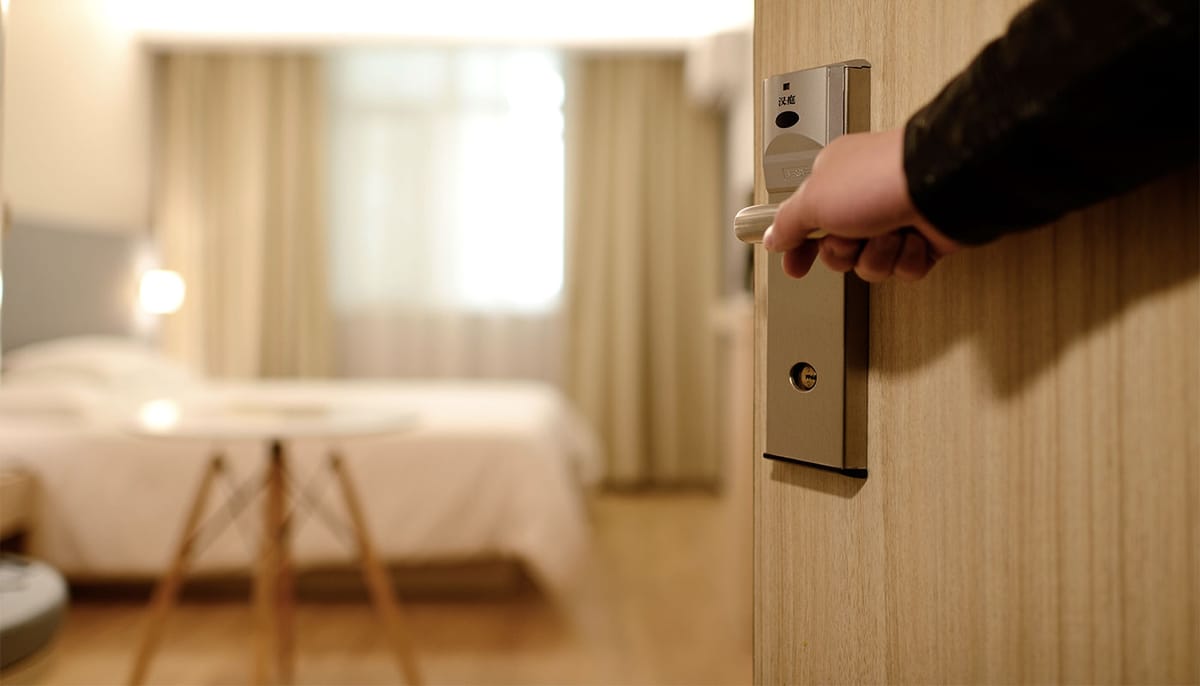Hotel Accessibility Ratings: A Comprehensive Guide for Travelers with Disabilities
When planning a trip, one of the most important factors for many travelers is hotel accessibility. For people with mobility challenges or other disabilities, choosing a hotel that meets specific accessibility needs can significantly impact the overall travel experience. Hotel accessibility ratings provide valuable insight into how well a hotel accommodates guests with special needs. In this article, we’ll explore what these ratings mean, why they matter, and how to choose the right accessible hotel for your stay.

What Are Hotel Accessibility Ratings?
Hotel accessibility ratings are a set of scores or evaluations that reflect how well a hotel accommodates guests with disabilities. These ratings assess various factors like wheelchair accessibility, the availability of accessible rooms, and the provision of essential services such as ramps, elevators, and accessible restrooms. The goal is to make sure that travelers with mobility issues or other disabilities can comfortably and safely enjoy their stay.
Key Factors Considered in Accessibility Ratings
-
Wheelchair Accessibility: Hotels should have ramps, wide doorways, and elevators that are easy to use for guests with wheelchairs.
-
Accessible Rooms: These rooms should feature lower countertops, grab bars in bathrooms, and sufficient space for maneuvering.
-
Public Areas: Hallways, restaurants, lounges, and other common areas should be accessible and free of barriers.
-
Parking: Accessible parking spots should be available near the hotel entrance.
Why Hotel Accessibility Ratings Matter
Hotel accessibility ratings help travelers with disabilities make informed decisions. By looking at these ratings, guests can identify hotels that provide the right level of support and accommodations. Without clear ratings, travelers may find themselves in difficult or unsafe situations due to poorly designed spaces.
The Importance of Accessible Travel
-
Independence: A hotel that’s accessible provides guests the independence to navigate spaces without the help of others.
-
Comfort: Proper accessibility features make the experience more comfortable, reducing stress and inconvenience.
-
Safety: Accessible hotels ensure that guests are safe, with clear pathways, secure bathrooms, and other essential features.
Inclusive travel is essential in today’s world, and ensuring that hotels meet accessibility standards is a big part of this movement.

How Are Hotel Accessibility Ratings Determined?
Hotel accessibility ratings are typically determined through thorough assessments conducted by experts in accessibility standards or organizations that specialize in ADA compliance. These assessments often follow guidelines set by the Americans with Disabilities Act (ADA) in the U.S. or similar international regulations.
Common Rating Systems
-
Wheelchair Travel Ratings: This rating system evaluates hotels based on accessibility for wheelchair users. Factors like room size, bathroom features, and the presence of necessary ramps are considered.
-
ADA Compliance: In the United States, hotels are required to follow the Americans with Disabilities Act, which provides a clear standard for accessibility. ADA-compliant hotels receive higher ratings for accessibility.
-
Independent Reviews: Some travel websites offer guest reviews or third-party evaluations focused on accessibility. These reviews may also provide insights on whether a hotel meets accessibility needs.
Key Features to Look for in Accessible Hotels
When looking for a hotel with strong accessibility features, consider the following key aspects that contribute to a higher rating:
1. Accessible Parking
Accessible parking spaces should be available close to the hotel entrance. These spaces should be well-marked and have enough space for a wheelchair or mobility device.
2. Room Features
Accessible rooms should have features like wide doorways, roll-in showers, grab bars in bathrooms, and adjustable beds. Look for rooms designed for wheelchair users with sufficient space for maneuvering.
3. Public Area Accessibility
Ensure that the hotel’s common areas—like the lobby, restaurant, and fitness center—are fully accessible. Ramps, wide corridors, and elevators should be available for easy access.
4. Accessible Amenities
Some hotels go the extra mile by providing additional amenities such as accessible swimming pools, wheelchair-friendly transportation, and adaptive equipment for activities.
5. Elevators and Lifts
Hotels with multiple floors must have elevators that are large enough to accommodate mobility devices. Lifts should also be located in areas that are easy to access and use.
Tips for Choosing the Best Accessible Hotels
When booking an accessible hotel, keep these tips in mind to ensure a smooth and enjoyable stay:
1. Read Reviews and Ratings
Check online reviews and accessibility ratings from trusted sources. Look for specific feedback from other travelers with disabilities to gauge the hotel’s actual accessibility level.
2. Confirm Accessibility Features
Before booking, always call the hotel to confirm that it offers the accessibility features you need. Hotels may update their facilities, so it’s better to double-check.
3. Look for Hotel Chains with a Reputation for Accessibility
Certain hotel chains specialize in accessible accommodations and are known for meeting the needs of travelers with disabilities. These chains often have consistent accessibility standards across their properties.
4. Check Location and Proximity to Attractions
A hotel may be accessible, but if it’s far from your main attractions or destinations, it could be inconvenient. Look for hotels that offer convenient access to local sights and services.
Why Accessibility Matters for Everyone
While accessibility is often associated with people with mobility issues, it benefits everyone. Hotels with good accessibility features, such as wide doors and clear signage, are more comfortable for all guests. Parents with strollers, older adults, and anyone carrying heavy luggage also benefit from an accessible environment.
Accessibility Guidelines Around the World
Different countries have different standards for hotel accessibility. However, many countries now have laws similar to the ADA in the United States, ensuring that hotels comply with basic accessibility requirements.
In the U.S.:
The Americans with Disabilities Act (ADA) requires hotels to provide accessible accommodations. This includes rooms with accessible bathrooms, the ability to request extra assistance if needed, and clear signage throughout the building.
In the EU:
The European Union has similar standards, although enforcement can vary by country. In general, EU guidelines emphasize providing accessible hotel rooms, ramps, and elevators in all public areas.
In Asia:
Some countries in Asia are still developing comprehensive accessibility laws for hotels, but many major hotels in cities like Tokyo, Singapore, and Hong Kong have embraced universal design principles.
FAQs About Hotel Accessibility Ratings
1. What should I look for when choosing an accessible hotel?
Look for accessible features such as wide doorways, ramps, roll-in showers, and spacious rooms. Confirm that the hotel provides accessible parking and public areas.
2. Are all hotels ADA-compliant?
Not all hotels are fully ADA-compliant. However, hotels in the United States must follow ADA guidelines if they are open to the public. Always check for specific accessibility features before booking.
3. Can I trust online hotel accessibility ratings?
Online hotel ratings can be a helpful resource, but they should be cross-referenced with direct confirmation from the hotel. Also, read user reviews to get a sense of the hotel’s real-world accessibility.
4. How can I make my hotel stay more accessible?
If the hotel lacks some accessibility features, speak with the hotel management beforehand to arrange any necessary accommodations. Many hotels are willing to provide extra services or rooms to make your stay more comfortable.
5. Do accessible hotels cost more?
In general, accessible hotels do not cost more than other hotels. However, premium accommodations like those with additional features (e.g., accessible pools or private transportation) might have a higher price.
Conclusion
Hotel accessibility ratings are crucial for travelers with disabilities, as they provide the information needed to make an informed decision about where to stay. From wheelchair accessibility to the availability of accessible rooms and amenities, these ratings highlight which hotels prioritize inclusivity. As travel becomes more accessible to everyone, it’s essential to keep looking for improvements and ensure that all hotels provide the facilities needed to support travelers with special needs. By choosing hotels with high accessibility ratings, you ensure a comfortable, safe, and stress-free travel experience.

